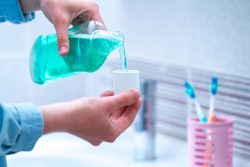 You may want to think twice before reaching for that bottle of mouthwash in your bathroom. A new study has revealed that the risks associated with these minty antimicrobials can have serious consequences for more than just your teeth. From skin irritation to cancer, certain ingredients have been linked to a wide range of side effects.
You may want to think twice before reaching for that bottle of mouthwash in your bathroom. A new study has revealed that the risks associated with these minty antimicrobials can have serious consequences for more than just your teeth. From skin irritation to cancer, certain ingredients have been linked to a wide range of side effects.
In a comprehensive study conducted in Istanbul, Turkey, researchers analyzed 45 mouthwash formulas from 17 popular brands. The results were alarming: over 68% of the tested formulas contained glycerin, a substance known to cause kidney and liver deterioration. Even more concerning, 64% of the formulas included sodium saccharin, a known carcinogen. Additionally, 62% of the mouthwashes contained propylene glycol, a chemical linked to organ failure in high doses. These findings raise serious concerns about the safety of everyday oral care products.
Out of 45 different formulas, a shocking 7 contain the tooth decay culprit, chlorhexidine gluconate. Other ingredients like cetylpyridinium chloride and acid orange 7 dye can lead to unsightly tooth discoloration and stains. With a limited range of options available in stores, our oral and public health is at risk.
When it comes to mouthwash, not all options are created equal. The two main types – therapeutic and cosmetic – offer different benefits for your oral health. Therapeutic mouth rinses, available over-the-counter or by prescription, pack a punch by combating plaque, gingivitis, bad breath, and tooth decay. They’re the real deal. On the other hand, cosmetic mouthwashes offer a quick fix for bad breath, but they don’t tackle the underlying issues of plaque, gingivitis, or tooth decay. They’re more like a temporary band-aid.
But wait, there’s more. Over the past decade, warnings and recalls have shed light on the potential dangers of mouthwash. In fact, a study linked frequent mouthwash use to an increased risk of Type 2 diabetes. The results showed that those who used mouthwash twice or more daily faced a significantly greater risk of pre-diabetes or diabetes compared to those who used it less frequently.
Discovering the true impact of commonly used mouthwash ingredients was the main objective of this study. The aim was to uncover any potential adverse effects, as well as understand how these ingredients are intended to be used. Previous research has shown that harmful compounds found in toothpaste can also be consumed through mouthwash, leading to a higher concentration within the body. It is crucial that dental care products containing these hazardous chemicals are eliminated to prioritize consumer safety. Additional research in this field is recommended to ensure we are fully informed.
To view the original scientific study click below:
Ingredients in Commercially Available Mouthwashes





